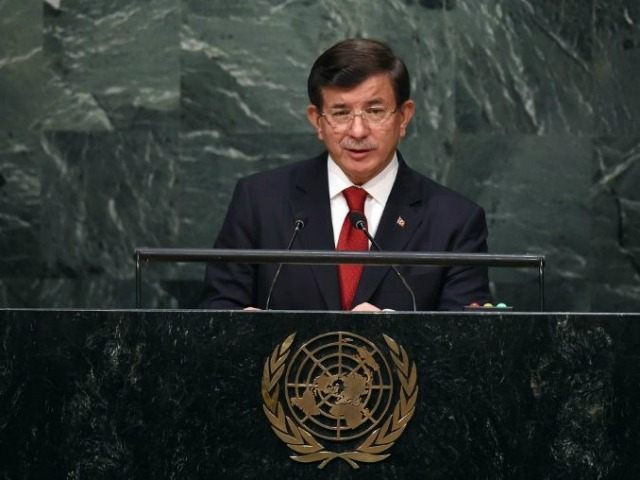Turkish Prime Minister Ahmet Davutoglu has responded to accusations that his party has not made enough of an effort to eradicate the Islamic State (ISIS/ISIL) from Turkey by asking of his detractors, “Look at me, look at my face. Do I have the face of someone who would support ISIL?”
Davutoglu was attending a public discussion with young voters in anticipation of next month’s parliamentary elections when he made the remark, reports Turkish newspaper Hurriyet. Some in the crowd had asked Davutoglu about claims made by opposition leaders, particularly pro-Kurdish leaders, who have accused Davutoglu, President Recep Tayyip Erdogan, and the Justice and Development Party (AKP) generally of being too soft on ISIS and potentially working with the terrorist group to diminish the strength of the Kurdistan Workers’ Party (PKK).
The PKK is a U.S. and Turkish designated terrorist group of Marxist ideology that has been working alongside Syrian Kurdish militias in the fight against the Islamic State. Davutoglu and others in the government have accused the PKK of working with ISIS in the past.
“Look at me, look at my face. Do I have the face of someone who would support ISIL?” Davutoglu asked his audience Monday, reiterating that, yes, he is Muslim, but “the Islam that we represent is exactly the opposite of ISIL. It is also the kind of Islam that will destroy ISIL.”
“Just like we need to not harm the identities of our Kurdish citizens and win them over while fighting against the PKK, there is also a need to be careful about not accusing or offending the religion of Islam … while fighting against ISIL,” he added.
Later that day, Davutoglu broke the news that the Turkish military has struck Kurdish militia positions in Syria twice. He made clear that the Turks had attacked the YPG/YPJ forces and not the PKK. “We have said ‘PYD will not cross west of the Euphrates, we would hit them the moment they do’ and we have struck them twice,” he said.
The PYD (People’s Democratic Union, the political wing of the YPG/YPJ) works with the PKK but is not considered a terrorist organization in the eyes of the United States.
The admission that the Turkish government has targeted the PYD is certain to inflame relations between the AKP and Turkish Kurds, as well as the People’s Democratic Party (HDP), a Kurd-friendly leftist party that made extraordinary political gains during the last round of elections this year, forcing Turks to return to the polls in November.
HDP co-chair Selahattin Demirtas has explicitly blamed AKP leadership for the twin suicide bombings that struck a Kurdish peace rally in the capital, Ankara, on October 10. The attack is considered the deadliest in post-Ottoman Turkish history. The apparent lack of security and subsequent slow operations on the part of Turkish police, Demirtas has argued, demonstrates a lack of will on the part of the AKP to protect Kurdish citizens.
Those accusations were exacerbated by the revelation that one of the suicide bombers involved in the Ankara attack was the owner of a tea house that was functioning as an ISIS recruitment center in Turkey. The tea house, named “Islam,” displayed the ISIS flag in the back and was a known hangout for jihadists. This includes both Ankara bombers and the suicide bomber–the brother of one of the Ankara attackers–who is responsible for an attack on Kurdish humanitarian workers in the border town of Suruç in July.
Davutoglu announced earlier this month that a number of PKK members had been arrested in relation to the Ankara bombing despite the overwhelming evidence that ISIS was responsible for the attack. He has claimed evidence suggesting the PKK worked with ISIS and the regime of Syrian dictator Bashar al-Assad to attack the Kurdish rally.
As of October 21, Turkey had arrested 1,000 more PKK than ISIS suspects since airstrikes began in Syria against ISIS in July. That number has changed overnight with the mass arrest of 71 ISIS suspects in a raid Tuesday. Police raided over a dozen houses in the town of Diyarbakır, known to be a terrorist operating base, as well as in Istanbul, Konya, and a number of cities across the country. Reportedly, at least seven ISIS suspects were killed. The Diyarbakır raid alone yielded at least 30 arrests, AFP reports.

COMMENTS
Please let us know if you're having issues with commenting.